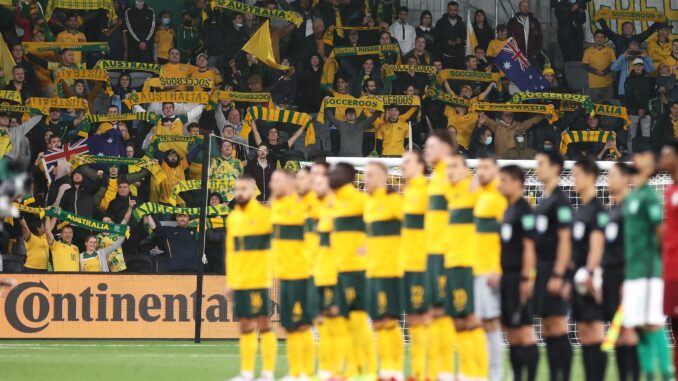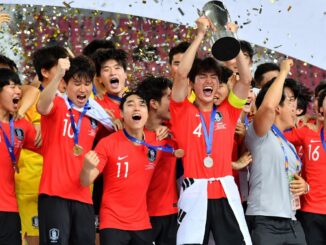
As the Australian Open tennis draws to a close this week, it will be hard for much to cut through in the Melbourne sporting landscape, as the newspapers and talkback radio shows will be filled with talk of Ash Barty or Nick Kyrgios and their exploits at Melbourne Park.
Precious little airtime will be given to the names of Tom Rogic or Maty Ryan, let alone Nguyen Quang Hai or Nguyen Cong Phuong, but the lack of column inches or talkback space sits in stark contrast to the importance of Vietnam’s visit to Australia this week.
Before the men’s or women’s champion is crowned at Melbourne Park this week, across the road at AAMI Park – or Melbourne Rectangular Stadium to give it it’s correct AFC-approved geometric name – Australia’s hopes of qualifying for Qatar 2022 go on the line.
Vietnam might not scream ‘box office’ to the increasingly insular Australian sporting media, but Thursday night’s clash – a must win home World Cup qualifier – ticks all the boxes.
At this stage, and in the position in which the Socceroos find themselves in Group B and with four games remaining, including crucial matches with Saudi Arabia and Japan in March, it’s hard to argue one match is more important than the other. At this stage, the next match is the most important.
So right now, that is Thursday night’s match against Vietnam, and while the media may struggle to pick up the importance of the clash the fans certainly haven’t, with the match sold out weeks in advance.
Australia can ill-afford another slip up. More points dropped against Vietnam, or Oman next week, would mean Australia can all but kiss goodbye their chances of finishing in the top two of Group B and qualifying directly for Qatar 2022. That would mean, unless something completely disastrous were to happen, finishing third and entering the torture chamber known as the playoffs; firstly against the third placed team from Group A (currently UAE) and then if they’re successful, the fifth best team from South America.
It is a path no team wants to take. Therefore, every game from this point forward becomes a must win, starting with Vietnam.
After a blistering start, with three wins from their opening three games, Graham Arnold’s side has stuttered more recently. A loss and two draws in their last three encounters has seen them cede ground, dropping to third behind an underwhelming Japan side and now five points behind the impressive Herve Renard-led Saudi Arabia.
It hasn’t just been the results themselves that have underwhelmed and disappointed, but the manner of the results.
The Socceroos have looked slow and out of ideas for large parts of those games, prompting former national team goalkeeper Mark Bosnich to launch a stinging attack on his former teammate and friend, after Arnold had claimed Australia had been “playing great” in the aftermath of draws with Saudi Arabia and China in the November window.
“It’s quite apparent, for me, the last two games, that not only teams have worked us out, but when it comes to having a plan B or plan C, there is nothing at the moment,” Bosnich said on Stan Sport FC.
“He’s going, ‘we’ve got the stats to back it up’. What stats?
“We all make mistakes…this is where you need someone around you to say ‘listen, gaffer, boss, Graham – please don’t be saying things like this because not only will the footballing public see through it, but you’re setting all of us up [for failure], you’re putting a target on us.’ How do you say you’re playing great?
“I’m sure, if he’s watching this, he will take it personally. He will say that he won’t, but he will. But it’s not [personal]. If he was playing great, we’d be saying they’ve been playing exceptional.
“I’m telling him – you are not playing great.”
While Arnold may claim the stats back him up, as the saying goes there are lies, damned lies and statistics. Statistics can be sliced and diced to prove any point and make any argument. Be that as it may, they are the best indicator we have, and when comparing stats across the Socceroos first six Asian Qualifiers, it’s hard to miss the decline in performance across the last three matches.
Looking at the two matches against China – same opposition, both in a neutral venue in the Middle East – allows for the best and most direct comparison.
In the opening game, a comfortable 3-0 win that could easily have been four or five-nil, Australia amassed 653 passes, creating 23 shots with an xG of 3.67. Dominant, and a fantastic start to qualifying.
In the return fixture, a 1-1 draw just two months later, it was a different story. Australia registered just 488 passes, creating only eight shots for an xG of 1.99.
While different tactical formations create different outcomes, what is obvious is that Australia moved the ball around less and created fewer scoring opportunities in the return match for a worse result. That much is fact.
That trend can be seen across the rest of the campaign.
In Australia’s first three games (all wins against China, Vietnam and Oman) they averaged 608 passes, 14.3 shots and an xG of 2.07. In their last three fixtures (loss to Japan, draws against Saudi Arabia and China) that dropped to an average of 455 passes, 9.7 shots and an xG of 1.31.
The drop off has been noticeable, not just in the stats but also in the eyes of everyone watching the games, and flies in the face of Arnold’s claims that his team is “playing great”.
Arnold, however, remains unperturbed. In typical ‘Arnie’ style, he is choosing only to look at the positives; being that Australia’s fate is still in its own hands. With four games remaining, if the Socceroos win all four they will qualify for the World Cup.
“We have everything in our own hands,” Arnold said last week.
“We have four games that we have to play between now and qualifying for Qatar, and I expect to win four games, and I expect us to go out there with more of a siege mentality.
“Obviously, the last game against China was disappointing, especially the result. But I expect a lot more than what we showed against China.
“We’ve got to get out there and, as I said, with that siege mentality, one game at a time, but with four games to go, win all four.”
Sounds simple, right?
But when qualifying for a World Cup, nothing is so simple.
While on paper a match against Vietnam, ranked 98th in the world and without a point in this phase of qualifying, might look easy, in reality it is anything but.
The ‘donut’ in Vietnam’s points column doesn’t tell the full story of their campaign and how competitive they have been.
In their opening game against Saudi Arabia in Riyadh, they took the lead in just the third minute and held the lead until just before the hour mark, with the Green Falcons requiring two second half penalties to get over Park Hang-seo’s side.
In their earlier fixture against Australia, played on a difficult pitch in Hanoi, Vietnam had a big shout for a first half penalty waved away. On another day and with another referee it could easily have been given. As it was, Ryan Grant’s goal just before half time was all that separated the sides at full time.
While Australia enjoyed 69% of possession, completing 626 passes to Vietnam’s 258, it was the hosts who had the most shots on goal, registering 11 to Australia’s five. While they were often poor quality efforts, their xG (0.56) was still higher than Australia’s (0.32).
China needed a 95th minute Wu Lei goal to steal all three points against Vietnam in October, while in November they only lost to Saudi Arabia and Japan by 1-0 margins.
While they aren’t winning games, they are making themselves a difficult team to beat, and that will be their motivation in their final four games. While hopes of the World Cup are gone, they don’t want to go through the entire campaign without collecting a point. They want to prove they can match it with Asia’s elite.
They have the players, and importantly the game style, to frustrate the Socceroos. While it might not be to everyone’s liking, their defence-first mindset under Park has served them well over the last few years, especially at the Asian Cup in 2019 where they made it to the Quarter Finals, losing to Japan again by just the 1-0 margin.
Arnold will be relieved to see the likes of Que Ngoc Hai, Do Duy Manh and Nguyen Tien Linh not in the squad that will travel to Melbourne, but his biggest challenge this week is the fact he may not be on the sidelines at all after testing positive for COVID-19 over the weekend.
While there remains a chance he will be freed from isolation on game day, it means he will have no contact with the players in the crucial days leading up to the game. As an international manager already frustrated at how infrequently he gets the chance to be one-on-one with his players, this latest setback is one that will no doubt irk the normally laid back Arnold.
There is never a good time to test positive for COVID, but for an international manager doing so just days before your first game in two months is just about the worst time imaginable.
Arnold, and Australia – at least those that are paying attention – will be hoping it’s not a portent for the week ahead.
Photo: Facebook/Socceroos
Listen to Episode 77 of The Asian Game podcast as we discuss Australia’s form slump and what it means for their chances of qualifying for Qatar 2022




